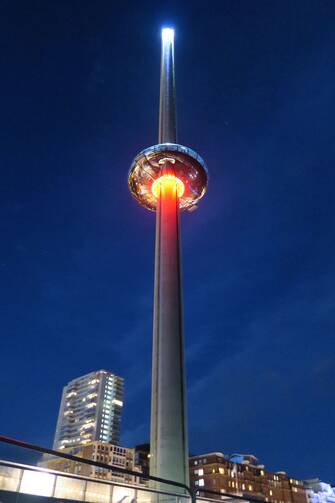We need cheering up from time to time, and it’s hardly irresponsible if we take the opportunity when it presents itself. The digital universe, responsible for much that is woeful, has expanded possibilities for fun, too, in a way we could never have imagined. Almost exactly four years ago, at the opening ceremony of London’s Olympics, the world recognized the world wide web’s British inventor Tim Berners-Lee with his catchphrase, “This is for everyone.”
Was there ever a truer forecast? Now anyone can post their thoughts just about anywhere around the world, for good or for ill. A cartoon of a few years ago showed a dog sat before a computer keyboard, typing: “On the web, nobody needs to know you’re a dog.”
Each nationality or ethnic group likes to claim a distinctive sense of humor. The Brits are no different. Ours, if one may generalize across this diverse and fragile union, tends toward the ironic and vaguely anarchic. That was the case well before we all went digital. Add to the mix a fondness for awful puns and the double-entendre—examples of which usually befuddle foreigners and which would be largely unprintable anyway—and you’ve got near the U.K.’s unique and killer comic combination.
Its best expression may have been in the “Carry On” series of films (not connected to the recent spate of “Keep calm and carry on” posters, mugs, etc.), which were no more than a scripted series of improbable romps carried forward on a tidal wave of suggestive double-meanings. Often involving buxom matrons, few examples are printable in an august journal such as this one. We might get away with citing one that was voted the funniest one-liner in movies, when Julius Caesar, played by the late Kenneth Williams in 1964’s “Carry on Cleo,” complained, “Infamy, infamy, they’ve all got it in for me.” And if that doesn’t work for you, perhaps you needn’t read any further.
A recent example of the special fun of bringing together that pawky sense of humor and the internet age arose when the city of Brighton, on England’s south coast, built an arrangement comprising a thin spire, up and down along which rides a glass circular contraption that is billed as “the world’s tallest moving observation platform.” That might be true; of course, one is hard pressed to think of too many others.
The 160-meter structure (that’s about 450-feet for the metric challenged) affords spectacular views of the South Coast and the English Channel, or more likely spectacular views of the layers of fog blanketing the same. This new contraption stands on the site of Brighton’s magnificent West Pier, which burned down in 2003, and it was meant to evoke and update memories of the great days of such Victorian piers. But the replacement spire provoked a response that was mixed at best.
Those piers were places of entertainment, with an egalitarian flavor. This supposed reimaging has caused mostly dissent, and not only over its cost of £46.2 million. The designers are the same people who gave us the Millennium Wheel that now dominates central London’s riverscape, almost opposite the Gothic awfulness of the Houses of Parliament (which are themselves about to consume billions in essential refurbishment work).
London’s Ferris Wheel got renamed and is now the London Eye. Brighton’s addition is to be known as the “i360.” At least, that was the plan, until that national sense of humor got to work on it.
Its architects were reported to be “infuriated” by alternative names spire detractors suggested. One architect, interviewed on BBC Radio, admitted that a few drew at least a smile while most were judged “infantile.” Sadly, few suggestions can be repeated here, as most reference its long vertical design. The replacement of “i360” with “iSore” is more benign than most suggestions and about the only one I can include here. Other less risky comparisons include giant doughnuts, alien spacecraft and lollipops.
One of the spire’s architects gamely tried to rescue the situation, claiming, “The ‘i’ stands for intelligence, innovation and integrity,” but few on the internet bought that and alternative names continued apace online. Anyone following the campaign were probably reminded of those great days of comical innuendo and cringing puns of the “Carry On” movies.
A few months ago we witnessed similar naming hilarity on the internet. This time the comic outcomes offered much less of the innuendo and arguably more of the plain, glorious silliness that is at the heart of British humor. A government department announced a competition to come up with a name for a new polar scientific research boat.
An internet campaign to name the vessel “Boaty McBoatface” surged online. One wag on an discussion board pondered if this was funny because of its essential stupidity or if there were a story behind the suggestion. If the latter, it hardly mattered. Few argued that “Boaty McBoatface” wasn’t funny, other than those responsible for the final naming of the ship in question.
Despite “Boaty’s” win in online polling, the ship ended up called the “Sir David Attenborough” after the celebrated naturalist and broadcaster. Most agreed that was a perfectly acceptable, if unfunny, result. At least part of the subversive fun the campaign generated lay in imagining proper government officials having to refer to the boat by its ridiculous moniker.
In instances like the McBoatface story, those in authority can either join the fun and swim with the tide, if you will, or sink absurdist campaigns and risk being labeled humorless, if not completely po-faced. But were they to be described with that last adjective, who knows what a skilled practitioner in pun and innuendo might come up with?
David Stewart, S.J., is America's London correspondent.








